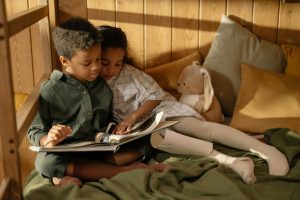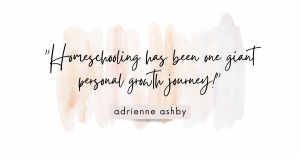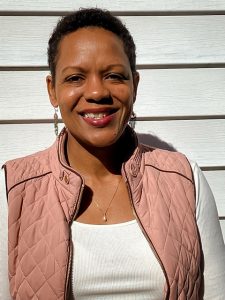Keeping a Sane Homeschool: An Interview with Adrienne Ashby
Today we’re meeting with another speaker from the VaHomeschoolers [un]Convention, Adrienne Ashby. It didn’t take long before we were both laughing about the ways we thought we would homeschool, the realities of what homeschooling truly looks like, and how different that is for everyone.
Adrienne has been homeschooling her 3 children since 2012, spending the four years prior to that researching options and, in true attorney style, preparing a case to her husband. Before she started this journey, she and her husband worked as attorneys in Atlanta, Georgia. Gathering a plethora of lessons along the way, she has mentored many homeschoolers, given many talks, and is still eager to pass them on to help other homeschool parents and families.
Adrienne herself was hesitant to jump into the homeschool journey but was also worried about the future of her children in their current public school system. As I said, she put years of research in before she made the leap, imagining all the ways she would educate her children. “We were Classical, we were Charlotte Mason, we were all the things in my mind.” She put a lot of weight on herself starting out, “We can’t just have good enough, it has to be perfect.”
Who here can say they didn’t also envision the perfect homeschool before they began?
Just like so many of us, her anxiety and worry were self-created, “What I felt within my own self, ‘I have to show them that what we’re doing is just as good as what they’re doing and that our kids are going to be bright too … I started with a chip on my shoulder that was only put there by myself.” It’s something so many of us have felt. The need to prove ourselves, but to whom? We’re with our children day in and day out, we know what they know and what they don’t.
Her training as an attorney left her with a great lesson that has been the core of her homeschooling, “Question everything”. She goes on to explain that in law school she was told the goal was to leave law school “thinking like a lawyer”, which to her translated into “question everything, don’t take what’s presented in front of you as the only answer or the right answer.” It’s this questioning of the status quo that she’s seen in every homeschool family she’s met. “It’s that critical eye, that constant questioning of what we consider the status quo… I think that is a part of every home school. Every homeschooler has questioned the dominant paradigm.” As for on a personal level within her own home, “I welcome questions and push back in our homeschool, even when it exhausts me. It’s a part of them learning critical thinking.” Her children are welcome to disagree, but the lawyer in her also asks them to back up the disagreement with reasoning. “I tell my kids, ‘Ask me anything, question anything,’ because if it’s something I feel strongly about I should be able to defend it as well. If something doesn’t stand up to the questioning, it isn’t worth its weight in gold.”
So when those moments in homeschool become too exhausting, what does Adrienne do for self-care? And what lessons does she want to pass on to you to keep your homeschool journey mentally healthy?
 “My go-to magic panacea, I don’t care if your kids are three or if they’re 18 because I have done it all the stages, is to pull out a read-aloud book … and start reading … to your children, but really to yourself.” Adding that you don’t have to be the one doing the reading, audiobooks are a great alternative.
“My go-to magic panacea, I don’t care if your kids are three or if they’re 18 because I have done it all the stages, is to pull out a read-aloud book … and start reading … to your children, but really to yourself.” Adding that you don’t have to be the one doing the reading, audiobooks are a great alternative.
Simple yet profound advice.
But it goes further, “a read-aloud covers a multitude of mistakes,” not only does it recenter you, but it also brings your children back in and helps to foster the relationship that is at the heart of why we homeschool. “We have a family lore based on the read-aloud we have. We have a shortcut where we can say stuff to each other, and we all crack up laughing because it was within the book we’re reading. It makes you closer as a family.”
And it doesn’t have to be a complicated, upper-level book. She goes on to explain that she chooses picture books for her children at all levels! “If you and your kids are trying to learn about a new subject, one of the easiest points of entry into that subject will likely be a picture book about it.” They’re written to be read by adults, not children, focus on the core concepts of the subject, and who doesn’t love good artwork?!
Well, time to order new books!
So, what has Adrienne found to be the most challenging part of homeschooling? “Adjusting to each child and maintaining momentum.” She’s in her 12th year of homeschooling. It was a lesson she didn’t learn immediately but developed over time as she continued to add children into her homeschool journey! “I had to look at the child in front of me and homeschool that child, the one sitting in front of me saying I don’t want to write an essay … the one saying, ‘Mom, I don’t want you to teach me math.’”
She also realized she didn’t have to be the ‘teacher’ for everything, and it was okay to outsource as needed, acknowledging this can be expensive. She has tips and tricks though and plans to speak more about “Outsourcing on a Budget” at the VaHomeschoolers [un]Convention.
(I would like to add, I would have LOVED to put all her knowledge here, but there is just too much for one blog post!)
And a huge reminder: “You don’t have to do everything every year!”
Her homeschool journey has thrown her a curve ball she didn’t expect as well, “What has surprised me most about homeschooling is how much I have changed. You think you’re going into this for your kids, for them to grow and learn, and you come out of it and YOU’RE a different person.” This change happens because, “you’re in full view of your children, they see you and they know you for better or worse … you have to actually be in front of them and every day decide to bring your best self, or to not bring your best self, and be honest.” It’s being present and unraveling the questions and answers of life and questioning the world. “It’s actually living life with your kids.”

“Homeschooling has been one giant personal growth journey.”
Does that mean every day has to look like perfection? No, “Perfection is the enemy of self-care.” Adrienne has learned this lesson by fire, “it makes you burn yourself out, which is the opposite of self-care.”
The lesson she wants you to hear? “There are things that are good enough.” She offered the example of her son picking out a coconut in the grocery store and asking to bring it home to open it. “That’s self-directed learning, I don’t have to make a whole lesson plan, I don’t have to prove to myself that he learned something.” He led his own learning and discovered many new things, she added, “I would have spoiled that entire thing for my older children, I would have made them write up an essay … because I needed to have it documented that I was doing a good job. The learning had already taken place.”
She learned to “watch the learning happen.” It brought her to a quote we often see from John Hold “Trust children.” The learning happens all the time, in video games, in conversations with friends, at the grocery store, and when she gives her children a stipend to invest.
How does she ensure she maintains her own sanity in what can be a chaotic homeschool, “Keep cutting until there’s peace.” What does that mean? “If you have three curriculums you’re working from and everyone is crying, you keep eliminating until there is peace.” Because, and the biggest takeaway from all of this self-care talk, ino learning until there is peace in your home.” A Charlotte Mason quote that has stuck with her and she has passed it on to many others seeking advice.
So, if you just read a poem and do puzzles all day, that counts? “The answer is YES!”
It’s so important to remember there must be a balance between self-care and homeschooling. What does this look like for Adrienne? She gives herself permission to take time for herself in the morning. “They tell you to fill your bucket and put the mask on yourself first, but what does that look like?” For Adrienne, it’s a walk while listening to music or a podcast, meditation, praying, and reading a bible passage. It starts her day on the right foot. She was quick to address that this is harder for parents with younger kids and how important a village is to be able to find these times for you.
Anyone who has been homeschooling for a while knows that there are ebbs and flows in homeschooling. As for Adrienne, she calls her current state “Minimum Viable Homeschooling”. She has taken on the role of facilitator and counselor and says she’s “relying on the foundation I laid”. Her biggest takeaway when life throws you curveballs, “You have time. You don’t even understand how much time you have.”
The lesson your child learns in these moments is “when you are overwhelmed, take a break. That won’t be taught in any curriculum, it will be your child watching you and saying I remember when my mom said, ‘I have nothing right now.’ And lying in bed. When your child leaves your home, they will remember that.” She added an important reminder, “We’re doing that live and in front of our children, for better or for worse.”
When asked what her best advice is for others, as if she hasn’t already given us so many great nuggets of wisdom, she had a separate answer for new homeschoolers and one for seasoned parents.
For new homeschoolers, “Start slowly. Do not go in with guns blazing. Ask me how I know.” It’s a hard lesson to hear, we all want to start strong and are afraid of getting it wrong. Adding another important reminder, we all need to hear again, “You have time.” If that means just starting with language, math, and a read-aloud, that’s great, and add as you feel confident.
For seasoned homeschoolers, “It is okay for homeschooling to look very different for each child … and it is okay to outsource whatever you need to to keep peace within yourself and to keep peace within your home.”
For those starting homeschooling in their later years, middle and high school, she offered a familiar phrase, “You have time.” We explored this further as those parents often feel like they don’t, but as a reminder, she added “One semester of community college is a year of high school.” She offers permission to take a pause, “Figure out what are the things that cause your child angst and why. Take the time to deschool … to get to know the child in front of you. Take the time to let your child figure out who they are, and while they are, observe.”
These are her, as Oprah would say, things she knows for sure.
When the conversation ended, I realized we had been chatting for two hours, but I could have soaked up her wisdom for longer, and am now even more excited to hear what she has in store at the [un]Convention.
She’s also excited to share what she’s learned over the years, from her own experiences, research, and talking with other homeschoolers, to both new and prospective homeschoolers, to seasoned homeschoolers looking to keep the momentum.
She left us with one last great quote:
“You’re going to continually evolve, you’re going to watch your child and who they are, and if you do that you can’t help but win.”
 Adrienne Ashby has been homeschooling since 2012 and attempts to balance homeschooling with practicing law. She has three children (ages 21, 19, and 13). Her two oldest children are now college students (United States Coast Guard Academy and United States Naval Academy). Adrienne is grateful for the freedom and responsibility of teaching her children at home. She served for 5 years as a board member of a Norfolk homeschool co-op, and in 2021 she helped co-found KINDRED Homeschool Collective. She has practiced law since 1998, and she has offered homeschool coaching services since 2020. When she is not homeschooling or working, she enjoys learning ballet, reading, and drinking tea.
Adrienne Ashby has been homeschooling since 2012 and attempts to balance homeschooling with practicing law. She has three children (ages 21, 19, and 13). Her two oldest children are now college students (United States Coast Guard Academy and United States Naval Academy). Adrienne is grateful for the freedom and responsibility of teaching her children at home. She served for 5 years as a board member of a Norfolk homeschool co-op, and in 2021 she helped co-found KINDRED Homeschool Collective. She has practiced law since 1998, and she has offered homeschool coaching services since 2020. When she is not homeschooling or working, she enjoys learning ballet, reading, and drinking tea.
Before joining Adrienne at the [un]Convention, take a moment to fill out this burnout survey and see where you are! https://www.mindtools.com/auhx7b3/burnout-self-test
Interview conducted and post written by Jess Koller.
Opinions expressed by individual writers in this blog do not necessarily reflect the views of the Board of Directors of The Organization of Virginia Homeschoolers, nor do they represent an official position of VaHomeschoolers. Writers’ views are their own, and readers are encouraged to research and explore homeschooling issues to their own satisfaction.
